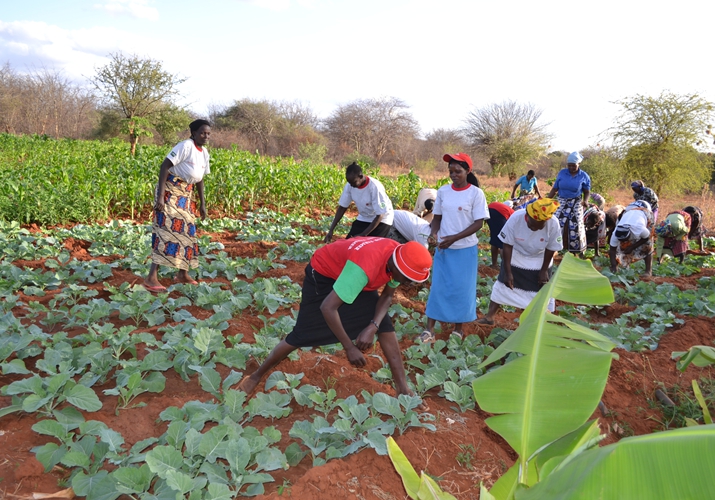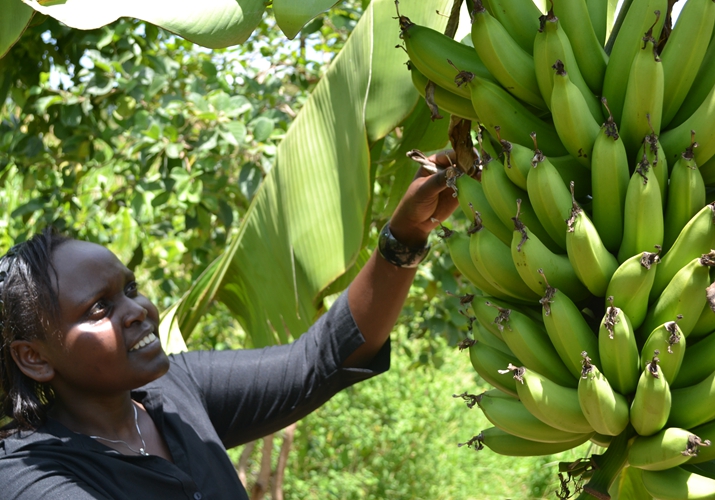Many farms in Kenya have made it through the pandemic tough times with the assistance of Chinese bank loans (CHARLES NJERU)
Phylis Wanjiru, 40, is a prolific farmer in central Kenya, making optimum use of the 8.5-hectare plot she inherited from her late father, who passed away in 2011. Engaged in a diverse range of production from livestock farming and horticulture to maize and dairy farming, Wanjiru is a bundle of energy.
"When my father passed away, I and my two siblings were left to fend for ourselves. We had two options, either to sell the farm and use the proceeds to move into the city, or collaborate and practice commercial farming. We decided to choose the second option. It is paying off, thanks to the assistance of bank loans. I would like to encourage my fellow farmers to seek loans to venture into farming," said a motivated Wanjiru, who recently got a loan from Bank of China.
She told ChinAfrica that the bank is willing to use her livestock and poultry as loan collateral, instead of using the actual farm land, as is customary.
"If you fail to pay back [the loan], the bank takes possession of the livestock and sells it, or the insurance company pays the debt in the case of livestock dying. That's what Chinese banks do, unlike other banks that will auction your farm," said Wanjiru.
Bank loans
Bank of China, one of China's oldest banks and also one of its four biggest state-owned commercial banks, has established an office in Nairobi, and has gotten the go-ahead from the Kenyan Government, along with four other Chinese banks, to offer loans.
The other banks involved are Industrial and Commercial Bank of China and China Development Bank, which will both launch regional offices in Nairobi in the near future as per the Banking Act. Under this law, foreign banks can register themselves through their agents who act as a liaison between the bank and its customers. The other two banks, China Merchants Bank and China Construction Bank are already operational in Kenya. All the banks have been licensed by the Central Bank of Kenya, the government's fiscal agent, to operate in the country.
Bank of China is offering millions of dollars in loans and grants specifically for COVID-19 relief to farmers, aimed to last all the way to December 31, 2021.
These loans are set to target a minimum of 20,000 to as many as 80,000 farmers countrywide, to improve the food security situation in the country.
"COVID-19 affected my farming activities for most of the period since March last year. I could not export my tomatoes, avocados, bananas and several other horticultural crops to Western Europe," said Wanjiru.
She said this is mostly because international flights had been banned, not only from Kenya, but across the world. Cargo flights, though allowed, were limited and carried mainly COVID-19 supplies.
Losing an income of export produce worth $5,000 per week was discouraging, she said, especially after paying air cargo costs, export companies and other export related costs.
Wanjiru said things are looking more promising since she received a loan of $10,000 from Bank of China, that will keep her afloat for some time.
A Kenyan farmer inspects her banana crop, which is flourishing with assistance from Chinese banks (CHARLES NJERU)
Benefit of financing
Apart from farmers like Wanjiru getting Chinese bank loans, the scheme is also targeting other sectors of the economy such as business start-ups that closed down last year due to the COVID-19 pandemic.
The government hopes that the prices of basic commodities, such as food, will drop through the issuance of loans and grants. Food prices have risen steadily for several months due to the impact of the COVID-19 and Kenya has relied more on expensive food imports.
While the loans are distributed by independent funds from banks, the government also partners with the institutions by distributing its own funds as well through partner banks.
According to Patrick Njoroge, Governor of the Central Bank of Kenya, there are now 19 foreign banks operating in the country.
"The economy has been underperforming, but I am confident to say that it is much better than we had predicted in January last year when COVID-19 was spreading globally like wildfire. The value of total exports from Kenya to Europe and China have grown by more than 40 percent, even when there were strict COVID-19 protocols," he said.
Njoroge said that the African economic growth was 3.1 percent last year. Kenya's economy grew slightly more than the continental average and slightly lower than the global average of 3.3 percent.
"With banks giving loans and more foreign banks being accommodated locally, including the China-based ones, there will be higher economic growth and employment creation," predicted Njoroge.
He said the agricultural sector in the country has been seriously affected by the pandemic. Many farmers lost harvests because either they died from COVID-19, or their clients succumbed to the pandemic. They also had large quantities of their crops wasted as there were less consumers to buy the produce.
"Loans to this group of people will go a long way in helping them get back on their feet," said Njoroge.
According to World Bank statistics, the entire African GDP is projected to grow by 4.1 percent by the end of December this year.
This low projection is partly because most of Africa is still battling the disease, and in some parts, the pandemic is at its peak of both infection and death rates.
"A new coronavirus strain that was discovered in South Africa and the United Kingdom has hit the country. A new vaccine that Kenya has ordered will make a difference, but the virus seems [to remain] unpredictable," said Loyce Ombajo, Virologist at Eastern Africa's largest referral hospital Kenyatta National Hospital.
As Kenya is one of the leaders in online trading on the continent, the Chinese banks have also established a partnership with the Kenyan Government.
"As the relationship between Kenya and China gets closer each day, business opportunities also grow. Online trading of agribusiness of the two countries has been on the rise. As a result, many Kenyan account holders have a range of accounts in the [Chinese] banks, from savings to business," said Njoroge.
Increasing numbers of exporters have opened business and salary accounts with Bank of China as bilateral trade between the two countries continues to grow.
According to the Kenya National Chamber of Commerce and Industry (a government agency under the Ministry of Industrialization, Trade and Enterprise Development), more Kenyan exporters are doing business with China.
"The number of exporters to China has increased rapidly in the last three years. At the same time, Kenya is issuing 500 export permits a month to Kenyan businesspeople to send goods to China. This is astonishing and it's just a matter of time before many of them open bank accounts in Chinese banks both locally and in China as well. So banking is of great mutual benefit for both Kenyans and Chinese," said Richard Ngatia, President of the Chamber.
(Print Edition Title: Banking on Security)
Reporting from Kenya
Comments to zanjifang@chinafrica.cn

